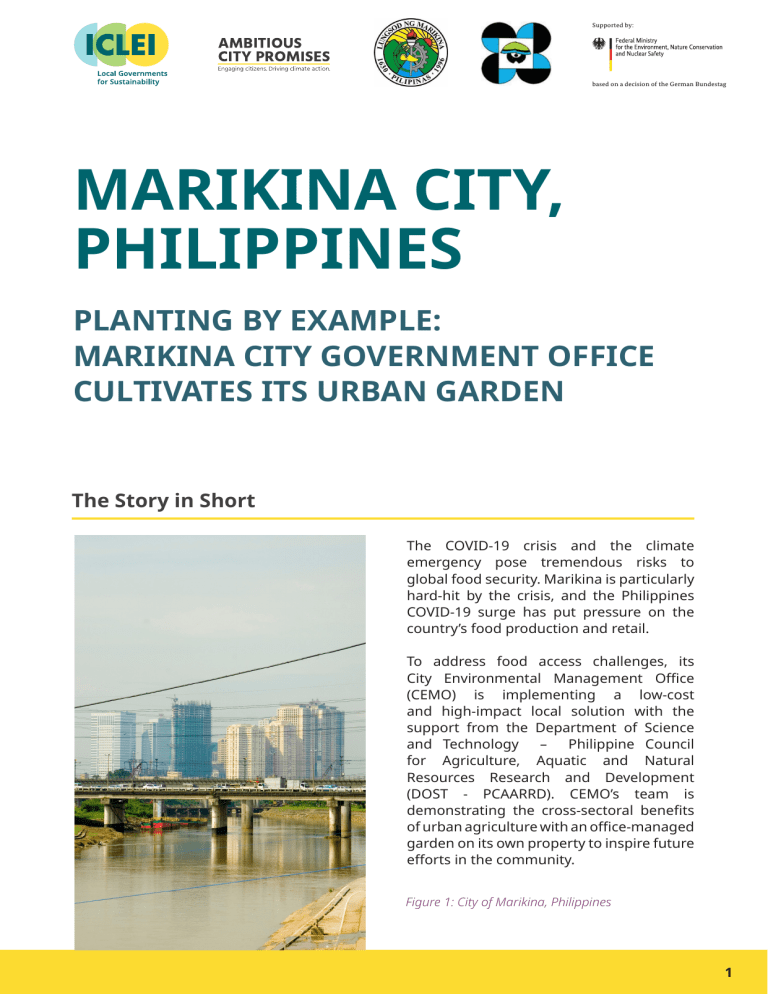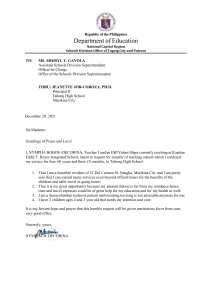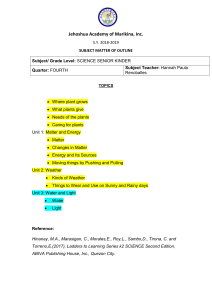
Supported by: based on a decision of the German Bundestag MARIKINA CITY, PHILIPPINES PLANTING BY EXAMPLE: MARIKINA CITY GOVERNMENT OFFICE CULTIVATES ITS URBAN GARDEN The Story in Short The COVID-19 crisis and the climate emergency pose tremendous risks to global food security. Marikina is particularly hard-hit by the crisis, and the Philippines COVID-19 surge has put pressure on the country’s food production and retail. To address food access challenges, its City Environmental Management Office (CEMO) is implementing a low-cost and high-impact local solution with the support from the Department of Science and Technology – Philippine Council for Agriculture, Aquatic and Natural Resources Research and Development (DOST - PCAARRD). CEMO’s team is demonstrating the cross-sectoral benefits of urban agriculture with an office-managed garden on its own property to inspire future efforts in the community. Figure 1: City of Marikina, Philippines 1 City Government of Marikina: Facts and figures Population Land area 450,741 (2015) 21.5 km2 Marikina City is the manufacturing hub of Metro Manila and is considered the Shoe Capital of the Philippines. Given the intense commercial and industrial activity, Marikina’s emissions are heavily skewed towards its energy sector. However, considering that Marikina City is a fairly small but highly urbanized city, emissions from the transportation sector are low relative to peers in Metro Manila. This can be attributed to the local ordinance on incentivizing the use of bicycles, which gives tax breaks to residents who cycle. Figure 2: Location of Marikina City, National Capital region, Philippines 2 Generating momentum for community gardening in Marikina In 2016, the City Government of Marikina enacted Ordinance No. 15 to institutionalize the development and promotion of urban gardening. The Ordinance views urban agriculture as a means to: Improve air quality Aid in reducing flood risks and urban heat island (UHI) effects Reduce costs associated with the delivery of food products Enhance productivity of idle lands Ensure the availability of healthier food products for the public Create and maintain a network of green spaces to maintain a healthy biodiversity Marikina’s earliest forays into community gardening were modest. In partnership with the Department of Environment and Natural Resources Office (DENR), an urban gardening project was introduced in the district of La Consolacion, but proved difficult to sustain with inconsistent participation. Since then, there had not been any local governmentled urban gardening activity. COVID-19 lockdowns beginning from March 2020 severely curbed the transport of goods, creating a nationwide dent in agricultural supply, particularly in Metro Manila where agriculture production is largely nonexistent. The Philippine government, under the Bayanihan Heal as One Act, DOST - PCAARRD, launched the GALING PCAARRD Kontra COVID-19 program. One of the components, Gulayan sa Pamayanan (community vegetable gardening), is designed to address availability and accessibility of fresh and healthy food. How did the Urban Gardening Ordinance come about? Marikina City was one of the hardest- hit cities when Typhoon Ondoy (Ketsana) ravaged Metro Manila and nearby provinces. Following this event, the national government passed the Climate Change Act of 2009, or RA 9729, to mainstream climate change into government policy formulations, thereby establishing a framework strategy and program on climate change. The following year saw the passage of a disaster management framework in the Philippine Disaster Risk Reduction Management, or RA 10121. In 2011, Marikina passed their climate change mitigation and adaptation ordinance pursuant to national laws. The urban greening program was part of this ordinance but attracted little attention. As mentioned earlier in the piece, an ordinance particular to urban gardening was created in 2016, giving birth to the local programs. 3 How one government office is leading the charge As one of the frontline offices providing continuous services despite the pandemic, CEMO’s 483 personnel are primarily street sweepers, garbage collectors, and cleaning operators. Mr. Oliver Villamena, head of the office, reached out to DOST to be a recipient of the COVID-19 assistance program. In October 2020, training was conducted for an Enhanced Potting Program (EPP) and Simple Nutrient Addition Program (SNAP) hydroponics. Within the CEMO office compound, a greenhouse system was built where vegetables using EEP and SNAP technologies were planted. Vegetables in the garden include lettuce, cabbage, okra, tomato and mustard. Mr. Villamena hopes to make people realize the joy of growing their own food and appreciate the effort along food’s eventual journey to the kitchen. CEMO’s pilot is hoping to give a proof of concept to successful community gardening in Marikina after previous efforts in 2016 encountered difficulties. At CEMO, having access to free vegetables has allowed staff to improve their diets by slowly incorporating vegetables into their meals. CEMO has already had four harvests since the program began, with CEMO’s personnel rotating in shifts to harvest the vegetables. The harvested vegetables are for the CEMO personnel consumption only, whereas other community farms sell excess supply. Aside from the hydroponic garden, CEMO also installed a bioreactor in its compound as a waste-to-compost facility. Compost essentially became fertilizer for the garden (to be planted with additional vegetables to increase production). Figure 3: A CEMO staff harvesting her cabbages. Each staff member has their own cups. Monitoring a Healthy Lifestyle One of the future activities is to monitor the program’s success on potential health benefits of urban gardening for CEMO personnel. Surveys will indicate whether the hydroponic garden was able to help staffers incorporate vegetables in their diet, or was able to create a shift to a certain degree in transforming to a healthy lifestyle. Additionally, to become more efficient with limited land area in the garden, Mr. Villamena is exploring the feasibility of vegetable seed production. This helps convince personnel and residents alike to plant in their own backyard when provided with the seedlings. 4 Mr. Villamena vowed to sustain and increase the urban gardening sites. Aside from collection of solid and liquid (used oil) wastes and leading the city in its clean and green program, CEMO is also maintaining vacant lots and idle lands. “These vacant lots and idle lands are the target sites to be transformed into urban community gardens,” Villamena added. With considerable staff personnel, the future urban gardens will be co-managed by the community and by CEMO. To maintain momentum, CEMO plans to intensify its information, education and communication campaign. They will share best practices in planting and harvesting vegetables with demos onsite and on social media accounts, as well as reviving the office Facebook account to promote community buy-in. The CEMO compound also doubles as a showcase, testing and educational area for the activities before it can be rolled out to the community. Interestingly, visits are open to students, institutions and organizations. Figure 4/5: The bioreactor can accommodate 1,000kg composed of 60% kitchen/food waste, 30% animal manure and sawdust, 10% inoculant to produce 200kilos of compost. Compost is used in CEMOs urban garden, given freely to the communities/homeowners in the city practicing urban gardening, or for sale as additional revenue for the office. Costs and Funding The training received from the DOST – PCAARRD is free of charge and includes the initial seedlings and materials needed in making the SNAP hydroponics. The cost of installing the greenhouse system (Php 77,000, or 1,598 USD) has been incurred by the office. To sustain the garden, CEMO procure seeds that cost around 10 USD per 1,000 pieces of vegetable seeds. “We at CEMO have already identified two other sites in the city managed by the community. We will reach out to them, collaborate, and strengthen our efforts in creating more urban gardens.” Mr. Oliver Villamena Assistant Chief of City of Marikina SNAP DOST – PCAARRD CEMO hydroponics free training funding 5 This series of local case stories is produced within the Ambitious City Promises project funded by the German Federal Ministry of the Environment, Nature Conservation and Nuclear Safety (BMU) through its International Climate Initiative (IKI). They represent solely the views of the authors and cannot in any circumstances be regarded as the official position of the BMU. Authors Ric Marfiga, ICLEI Southeast Asia Secretariat Tim Lazaroff, ICLEI World Secretariat The media are free to use the stories and may download content at www.iclei.org/publications Municipality contacts Mr. Oliver Villamena City Environmental Management Office olivervillamena@yahoo.com https://marikina.gov.ph/webmarikina/ The-Shoe-Capital-of-the-Philippines.html Editors and Reviewers Jiwon Lee, ICLEI World Secretariat Mary Jane Alvarez, ICLEI Southeast Asia Secretariat Dana Vigran, ICLEI World Secretariat Supported by: Design Olga Tokareva, ICLEI World Secretariat Alice Fraccaro, ICLEI World Secretariat based on a decision of the German Bundestag COPYRIGHT © 2021 ICLEI – Local Governments for Sustainability e.V. All rights reserved. The ICLEI World Secretariat holds the copyright of this publication, including text, analyses, logos and layout designs. Requests to reproduce or to quote material in part or in full should be sent to iclei.ws@iclei.org. ICLEI encourages use and dissemination of this report, and permission to reproduce this material without modification will usually be permitted without charge for noncommercial use. ICLEI – Local Governments for Sustainability is a global network of more than 2500 local and regional governments committed to sustainable urban development. Active in 125+ countries, we influence sustainability policy and drive local action for low emission, nature-based, equitable, resilient and circular development. Our Members and team of experts work together through peer exchange, partnerships and capacity building to create systemic change for urban sustainability. Contact Us Kaiser-Friedrich-Str. 7 53113 Bonn | Germany Tel. +49-228 / 97 62 99-00


